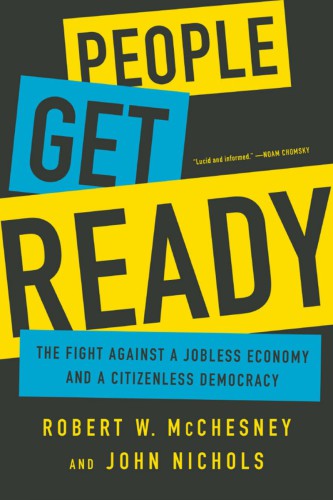
People Get Ready
The Fight Against a Jobless Economy and a Citizenless Democracy
کتاب های مرتبط
- اطلاعات
- نقد و بررسی
- دیدگاه کاربران
نقد و بررسی

January 4, 2016
In a stirring call to arms, McChesney (Blowing the Roof off the Twenty-First Century) and Nichols (The S Word) argue that although the digital revolution has been world-shaking and ruthlessly efficient, it has fallen short of ushering in the utopia some have predicted, because the ability to determine the future has been concentrated among just a few powerful people. Global automation and dislocation—the result of which is that a tiny fraction of the workforce once needed can now complete the same amount of work—will soon lead to unemployment of a startling magnitude. No one has a plan to resolve this looming so-called jobless economy, not even the big tech companies that helped create the situation. Moreover, the authors find that historically, the U.S. government does not take action until faced with catastrophe. McChesney and Nichols warn of a “citizen-
less democracy,” in which politicians pander only to the needs of a few wealthy donors, leaving the majority in the dust and excluding them from the process of worldbuilding. This necessary if unsettling read is not an attack on tech, but on dangerous, unchecked capitalism.

February 1, 2016
An energetic if grim discussion of inequality and the coming era of underemployment, viewed through the lens of the forgotten American progressive narrative. McChesney (Communications/Univ. of Illinois; Digital Disconnect: How Capitalism is Turning the Internet Against Democracy, 2013, etc.) and Nation Washington, D.C., correspondent Nichols bring clear urgency to this sprawling polemic, which encompasses politics, the cybereconomy, the decline of critical journalism, and historical movements beginning with America's founding. They describe the post-2008 recession era as a "maelstrom" of inequity, pointing toward worse times in the labor market: "the debate about where technological change is headed is already settled in the circles of those who intend to profit from that change." This pessimism is linked to what the authors convincingly portray as the decay of representative governance. Both parties, they argue, have pursued tax and trade policies that have stealthily undermined blue-collar jobs and middle-class stability. "This is the means," they write, "by which unelected bankers and billionaires most effectively and steadily define the popular discourse." Such dire chapters contrast with a vividly rendered history of the development of a now-tattered "democratic infrastructure," beginning with the state constitutional conventions of the late 18th century, more populist than what ultimately became the U.S. Constitution. The authors follow this thread through the Progressive Era and Franklin Roosevelt's New Deal, portrayed as the precursor to an ambitious "Second Bill of Rights," forgotten at the dawn of the Cold War. Similarly, a fascinating chapter documents a forgotten progressive coalition poised to achieve great gains during the 1970s, only to be thwarted by the recession and a cunning pro-business lobby: "There was a tenfold increase in corporate federal lobbying by the 1980s." McChesney and Nichols conclude with a lengthy proposition for how the ranks of the underemployed could similarly regroup to protect workers' interests. "Economic planning needs to be democratized and popularized and made accountable," they write. An authoritative account of the challenges facing progressives wishing to fuse better governance with economic justice.
COPYRIGHT(2016) Kirkus Reviews, ALL RIGHTS RESERVED.

























دیدگاه کاربران